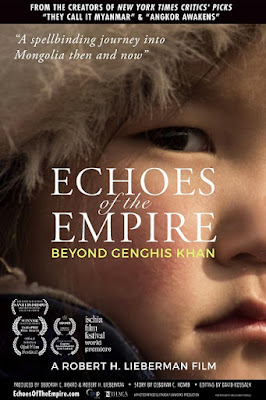Today, you can find the name “Genghis Khan” everywhere throughout modern Mongolia. He sits magnificently astride the monumental equestrian statue erected in 2008, which has quickly become one of the nation’s top-drawing (and literally biggest) tourist attractions. Yet, during its years as satellite-state of the Soviet Union, Genghis Khan was demonized in propaganda and banished from public discourse. A lot of good change came quickly to Mongolia, but the nation is still struggling to process subsequent social upheavals. Director-cinematographer-co-producer Robert H. Lieberman chronicles Mongolia’s glorious history and examines its future challenges in Echoes of Empire: Beyond Genghis Khan, which opens in select theaters this Friday.
Ironically, everything bad you might think about Genghis Khan (a.k.a. Temujin) is largely the result of Communist disinformation. Yes, he was a conqueror of kingdoms, whose empire spanned three times the territory Alexander the Great controlled at his peak. However, as he incorporated new people into his empire, he extended to them rights they never had. Arguably, Genghis Khan “invented” the right of religious liberty, as we know it today. He also forbade the kidnapping of women and established an early form of diplomatic immunity.
Yet, the Communist regime jealousy suppressed celebration of the Mongolian national hero. (For comparable hypotheticals of a nation erasing its cultural-historical legacy, imagine the United Kingdom trying to cancel King Arthur, or America forbidding mention of George Washington, neither of which quite captures the scope of the Communist Party’s negation of Genghis Khan.)
One historical episode explained in the film that has particular resonance for our world today came relatively early in Genghis Khan’s career of conquest, when the Uyghur people sent an emissary, inviting his invasion of their lands, in order to liberate them from their oppressors. It came as a surprise to the Mongol leader, but he obliged.
The film also archly observes how many commissars from the early Communist era met suspiciously premature demises—and openly invites the audience to make the obvious conclusions. Even more fundamentally, when watching Lieberman’s film, viewers will be immediately struck but the sensitive geographic position Mongolia occupies, as a functioning democracy nestled between China and Russia.
It is pretty clear Mongolia is a country Americans should be thinking about much more than we are. Although Mongolians have pretty forcefully repudiated the Twentieth Century Communist era (the 130-foot Genghis Khan memorial says so, loud and clear), they still have to maintain cordial relations with Russia. They also have considerable cultural ties, having adopted Russian tastes in opera and ballet, to a surprising extent, as Lieberman and company vividly illustrate.
Furthermore, Americans can well relate to Mongolia’s current struggles with increased urbanization and a widening gap between the city life of Ulaanbaatar (UB) and the traditional way of life on the steppe. Lieberman takes viewers into the gers (or yurts) of traditional herders, which look warm and cozy on the steppe. However, he also illustrates the downsides to coal-heated ger-living in the urban tent-cities of nomads who have been recently force to relocate to UB.
Echoes is not travelogue, but it still captures the dramatic sweeping vistas of the steppe and the horsemanship of the nomads. Michael Roberts’ aerial cinematography of the Genghis Khan monument could also very well spur in Mongolian tourism among viewers, which would not be a bad thing. There are some amazing visuals in this film, which tie together the nation’s past and present.
Lieberman previously helmed They Call it Myanmar and Angkor Awakens, which similarly helped explain the history and current political realities of Myanmar (Burma) and Cambodia, with an unspoken understanding that establishment media outlets are not doing a sufficient job covering those countries. Perhaps most importantly, his films prove international cultures and foreign policy should not be dismissed as boring.
American audiences might be frustrated to learn we ignored Mongolia’s calls for help fighting the psychotic warlord Baron von Ungern-Sternberg, but supplying arms and ferrying troops to Mongolia in 1921 would have been a very tall logistical order. Unfortunately, only the Soviets came to their aid, forcing them into a highly Faustian bargain. Indeed, there are applicable geo-political lessons to be learned throughout Echoes of Empire. Highly recommended, it opens Friday (6/3) in Los Angeles and the next week in DC.

